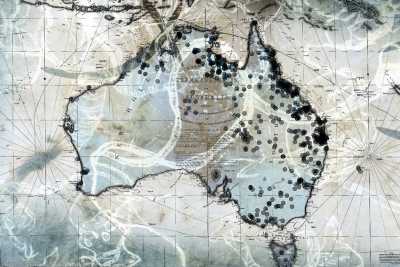The Center Announces 2020 International Conference: "Mass Violence and Its Lasting Impact on Indigenous Peoples - The Case of the Americas and Australia"
In 2020, on Indigenous Peoples' Day (formerly known as Columbus Day) -- October 12, 2020 -- the USC Shoah Foundation Center for Advanced Genocide Research will launch a three-day international conference entitled “Mass Violence and Its Lasting Impact on Indigenous Peoples - The Case of the Americas and Australia/Pacific Region”. The conference will provide a forum for leading and emerging scholars and knowledge holders from around the world to present groundbreaking research on the topics of genocide against Indigenous peoples (especially in North America, Latin America, and Australia), the long-lasting effects of mass violence on those communities, and their resistance, agency, and possibilities for change.
While a small number of academic conferences have addressed the topic of genocide of Indigenous peoples in the past, these conferences have generally focused on a single case or a single targeted population. The Center’s 2020 conference will be the first international conference to gather international scholars and knowledge holders working on this topic across a variety of historical, cultural, and geographic contexts. Given the breadth of the topic and its relevance worldwide, the conference could include cases as diverse as genocide or mass violence against the Maya in Guatemala, Native Americans in the United States, Indigenous peoples in Canada, Aboriginal peoples in Australia, Maori in New Zealand, and many other cases of mass violence against Indigenous peoples in the Americas and Australia. (A future conference will focus on Africa and Asia).

Source: the names of places
Indigenous Australian artist Judy Watson and her collaborators created a multimedia project documenting the massacre sites of Indigenous Australians across Australia.
By convening international experts on a range of cases from a variety of academic disciplines, the Center plans to foster interdisciplinary and intercultural discussion and debate about the common dynamics, patterns, and features that we can identify across these cases, as well as the specificities and unique factors that shaped manifestations and effects of and reactions to mass violence in each community. The conference will shed light on lesser-known and under-researched instances and aspects of genocidal violence against Indigenous peoples.
The conference will stimulate new questions and challenge traditional views about the concept and definition of genocide; distinctions between genocide, war, mass violence and colonial expansion; and relations between mass violence, gender and race. The organizers encourage contributions taking comparative approaches between genocides of various Indigenous communities and between indigenous and non-Indigenous cases. Of special interest are the many dimensions of cultural genocide, such as prohibiting languages and cultural and religious practices, forced assimilation of children into non-Indigenous communities, forced relocations of communities, and the forced transfer of human remains, sacred cultural objects and artifacts to museums, research institutions and universities. In its attention to the long-lasting impacts of mass violence against Indigenous peoples, such as collective emotional trauma, restricted access to resources, environmental disasters, and mass incarceration, the conference will deepen our understanding of the intergenerational effects of mass violence and raise challenging questions.
The conference will be organized according to the recommendations of the 2007 United Nations Declaration on the Rights of Indigenous Peoples. The organizers especially encourage and support the participation of Indigenous scholars and members of affected communities. The conference is being co-organized by Lorena Fontaine (University of Winnipeg, Canada), Dorota Glowacka (University of Kings College, Halifax, Canada), Wolf Gruner (USC Shoah Foundation Center for Advanced Genocide Research, Los Angeles, United States) and Irma A. Velásquez Nimatuj (Guatemala/Stanford University) with the help of an advisory committee composed of experts in the field.
The conference will be livestreamed so that scholars and community members around the world can watch and participate via social media. Videos of the conference will be available to watch online afterwards.
In addition to the scholarly panels, the conference schedule will include cultural programming, such as musical and dance performances and film screenings.
The conference's organizing committee is currently identifying strategic partners to contribute to funding, supporting, and promoting the conference. Interested parties are invited to contact the Center at [email protected].
To receive email updates about the 2020 conference, click here.
Note: Image above courtesy of the Centre For 21st Century Humanities, The University of Newcastle, Australia, which created a digital map of frontier massacres in Australia as part of its “Colonial Frontier Massacres in Central and Eastern Australia 1788-1930” project. The yellow dots depicted here represent the sites where Aboriginal or Torres Strait Islander People were massacred.